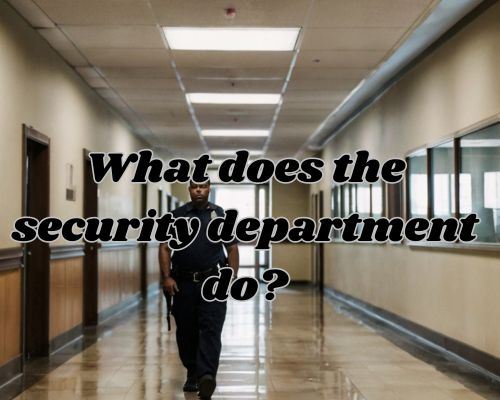
What Does the Security Department Do? Comprehensive Overview of Roles and ResponsibilitiesWhat Does the Security Department Do? Comprehensive Overview of Roles and Responsibilities
The Security Department plays a crucial role in maintaining the safety and integrity of an organization. For the U.S. Department of Homeland Security (DHS), this department is responsible for various tasks.

These tasks include counter-terrorism measures, border security, immigration enforcement, and cybersecurity. With more than 260,000 employees committed to its mission, DHS is structured into multiple operational component agencies, each focusing on specific aspects of national security.
Within the SCP Foundation, the Security Department is tasked with guarding secret bases and preventing containment breaches. This division ensures that SCPs (Secure, Contain, Protect entities) do not escape, manages D-class personnel, and defends facilities from external threats. By understanding these responsibilities, you gain insight into how security operations are essential to preventing catastrophic events and maintaining order.
Sherlock Holmes from Ali Private Investigator Tampa highlights “In both the public and private sectors, the mission of any Security Department centers on safeguarding assets, personnel, and data. Whether it’s the intricate network of DHS or the specialized units in fictional realms, security departments form the backbone of organizational resilience and safety. This intricate web of responsibilities highlights the importance and complexity of security operations in today’s world.”
Roles and Responsibilities
The security department undertakes a wide range of roles and responsibilities aimed at safeguarding the nation. These include the prevention of terrorism, management of borders, disaster response, and support to community resilience.
Preventing Terrorism and Enhancing Security
Your primary mission involves protecting the United States from terrorist threats. This role includes activities such as surveillance, intelligence gathering, and law enforcement operations. The Department of Homeland Security (DHS) works closely with federal, state, and local agencies to identify and neutralize potential threats.
“Leadership in this area is crucial. You need to provide continuous training programs for personnel and use advanced cybersecurity measures. It further encompasses securing critical infrastructure and facilitating effective communication between agencies to ensure timely responses to emerging threats.” said Sherlock Holmes from Ali Private Investigator Tampa.
Securing and Managing Borders
Border security is another critical function. This involves close cooperation with Customs and Border Protection (CBP) and other relevant agencies. You are responsible for immigration enforcement, customs inspections, and preventing illegal border crossings.
The role also includes monitoring ports of entry, both land and sea, to ensure that contraband, drugs, and weapons do not enter the country. Advanced technology and physical barriers are employed to secure borders, while training for personnel is continuously updated to adapt to new challenges.
Disaster Preparedness and Response
You are also pivotal in coordinating efforts for disaster preparedness and response. This includes planning for natural disasters such as hurricanes, earthquakes, and floods, as well as other types of emergencies. Agencies like FEMA (Federal Emergency Management Agency) play a key role.
The focus is not only on immediate emergency response but also on long-term recovery. This requires efficient crisis management, resource allocation, and constant training of personnel. You must be prepared to mobilize quickly to contain and alleviate disaster impacts.
Supporting National and Community Resilience
Supporting both national and community resilience is essential to your mission. This involves not just federal initiatives, but working with local communities and residents to enhance their capacity to withstand and recover from crises.
Training and resources are provided to local entities to improve their disaster preparedness and recovery plans. Community support programs are also in place to help residents develop personal emergency plans and ensure they have the support needed during crises. This collaborative effort enhances the overall resilience of the nation.
Departments and Agencies
The security department, particularly Homeland Security, comprises various components dedicated to maintaining public security and safety. These components are classified into operational and support segments, each playing a crucial role in protecting the nation.
Operational and Support Components
Operational components are the forefront of Homeland Security’s mission. Key entities include Customs and Border Protection (CBP), which oversees the nation’s borders, and the Coast Guard, responsible for maritime security. Additionally, the Office of Intelligence and Analysis enhances the department’s intelligence capabilities.
Support components provide essential backing to operational units. Departments like the Medical and Scientific sectors ensure readiness and response capabilities. The Security Officers handle internal security, while various other offices support leadership, policy-making, and administrative functions necessary for cohesive operation.
Internal Security Operations
Internal security operations are critical for ensuring the smooth function of Homeland Security. Security Officers play a significant role. They manage internal threats and oversee identity verification processes.
Patrolling units are tasked with on-the-ground security. They maintain vigilance against possible breaches or threats.
Special entities like the Scientific Department and the SCP Foundation work on classified and advanced security research. They contribute to the evolving landscape of threats. Additionally, coordination with intelligence agencies helps in analyzing and mitigating potential risks.
The integrated efforts of these divisions ensure comprehensive protection of both the infrastructure and personnel.